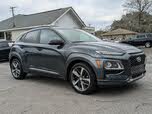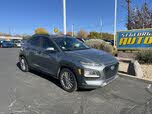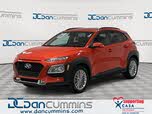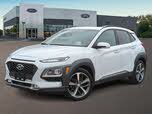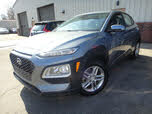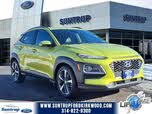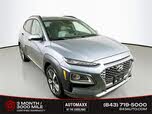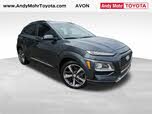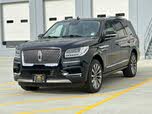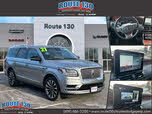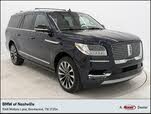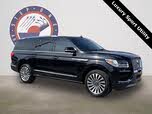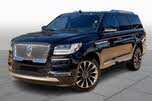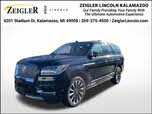2020 Hyundai Kona vs 2021 Lincoln Navigator
Overview | ||
MSRP | $20,300 | $76,705 |
Average price | $16,502 | $50,320 |
Listings | ||
Ratings & Reviews | ||
User reviews | ||
Expert reviews | 6.8 out of 10Read full review | 7.7 out of 10Read full review |
Pros & cons | Pros
| Pros
|
Summary | The Hyundai Kona subcompact SUV is one of the smallest cars you can buy with all-wheel drive. It competes in a class of four-door hatchbacks with the lifted suspensions and higher driving positions that crossover buyers want—and with the same generous list of convenience and safety features that come on larger crossovers. We last tested the Kona when it came out for 2018, but a new trim level and more standard driver assists are the major changes for 2020. For what Hyundai charges, the Kona is cramped and the interior disappoints, yet exterior style and on-road performance are spectacular. | Full-size SUVs like the Lincoln Navigator represent the smallest slice of the luxury SUV market. They're the heaviest, hugest, and fanciest people movers sold by mainstream automakers—and you can count them all on two hands. The Navigator, a popular nameplate since 1998, was redesigned in dramatic fashion for 2018. In its fourth model year, this Navigator still delights us as we test newer competitors costing at or above its $77,000 starting price. Foreign nameplates offer no equal to the Navigator, and it's not for sheer size or a desire to lift up Lincoln that we say this is one of the best American vehicles, among both trucks and cars, ever made. |
Video | No video found | |
Popular Features & Specs | ||
Engine | 2.0L 147 hp I4 | 3.5L 450 hp V6 |
Drive Train | FWD | 4X2 |
Seating Capacity | 5 | 8 |
Horsepower | 147 hp @ 6200 rpm | 450 hp @ 5500 rpm |
MPG City | 27 | 16 |
MPG Highway | 33 | 22 |
Engine | ||
Engine Name | 2.0L 147 hp I4 | 3.5L 450 hp V6 |
Torque | 132 lb-ft @ 4500 rpm | 510 lb-ft @ 3000 rpm |
Horsepower | 147 hp @ 6200 rpm | 450 hp @ 5500 rpm |
Drivetrain | FWD | 4X2 |
Fuel Economy | ||
MPG City | 27 | 16 |
MPG Highway | 33 | 22 |
Interior | ||
Leather Seats | Standard | |
Seating Capacity | 5 | 8 |
Key Features | ||
Navigation System | Standard | |
Safety | ||
Front Crash Overall | 5 | 5 |
Side Crash Overall | 5 | 5 |
Dimensions & Capacity | ||
Cargo Space | 19.2 cu ft | 20.9 cu ft |
Curb Weight | 2890 lbs | 5673 lbs |
Height | 61.0 in | 76.4 in |
Length | 164.0 in | 210.0 in |
Width | 70.9 in | 93.8 in |
Wheelbase | 102.4 in | 122.5 in |
Maximum Payload | 1089 lbs | 1620 lbs |
Number of doors | 4 | 4 |
Maximum Towing Capacity | 8600 lbs | |
Standard Towing Capacity | 6200 lbs | |
The 2020 Hyundai Kona was a standout in its segment, boasting a sleek, sporty, and dramatic exterior that belied its mass-market economy car status. Despite being several inches shorter than its competitors, the Kona's design cleverly masked its stubbiness with tiered lighting, a tall grille, and chunky matte plastic trim. The slim LED running lamps, headlights spaced to the car's edges, and optional fog lights created an illusion of a taller and wider vehicle. The fender creases, black trim, and two-tone wheels added to its premium vibe, making it visually stimulating from every angle. However, the interior did not match the exterior's excitement, with hard plastics and lackluster finishes dominating the cabin. While the buttons and screens were high-quality, the overall fit and finish fell short compared to rivals like the Mazda CX-30 and Honda HR-V.
In contrast, the 2021 Lincoln Navigator exuded elegance and understatement, a challenging feat for a three-ton truck. Its rectilinear shapes, body-color grille, and full-width taillight assembly gave it a classy appearance, complemented by splashes of chrome. The Pristine White example with a white-painted grille, black wheels, and illuminated Lincoln logo was particularly striking. Inside, the Navigator impressed with seven color palettes and finer details like layered wood trim and a floating center console. The materials were top-notch, and the panel gaps were tight, especially in the Black Label trims. The Perfect Position seats, with their 30-way adjustability, added to the luxurious feel, making the Navigator a standout in its class.
The 2020 Hyundai Kona surprised many with its impressive powertrain and chassis. The 1.6-liter turbocharged inline-four engine produced 175 horsepower and 195 pound-feet of torque, outperforming most competitors. This engine, paired with a 7-speed dual-clutch transmission, delivered strong acceleration and confidence-inspiring performance. The standard engine, a 2.0-liter inline-four with 147 hp and 132 lb-ft, was less impressive but still competitive. The Kona's handling was a highlight, with fast and direct steering, a tight suspension, and minimal body roll. However, the ride was stiffer, and the cabin was noisier compared to rivals. Fuel economy was average, with the 1.6T AWD achieving 26 mpg city, 29 mpg highway, and 27 mpg combined.
The 2021 Lincoln Navigator featured a powerful twin-turbo V6 engine from the Ford Raptor, producing 450 horsepower and 510 pound-feet of torque. This engine, paired with a 10-speed automatic transmission, made the Navigator feel surprisingly sprightly. The 4WD system was smooth and responsive, and the towing capacity was impressive at 8,300 pounds for 4WD models and 8,700 pounds for RWD models. However, fuel economy was poor, averaging in the teens, and the suspension felt rudimentary compared to competitors. The steering and brakes lacked the precision of the Cadillac Escalade, but the Navigator's low-end thrust and quiet cabin made it a refined and powerful highway cruiser.
The 2020 Hyundai Kona struggled with interior space, offering only 19 cubic feet of cargo space and 46 with the rear seats folded. This was significantly less than competitors like the Honda HR-V and Buick Encore GX. The rear seats provided average legroom and headroom, but the overall space was cramped. Despite its easy-to-use controls and good sightlines, the Kona fell short as a utility vehicle, feeling more like a small hatchback than a true crossover.
The 2021 Lincoln Navigator, on the other hand, offered ample space for passengers and cargo. It could comfortably seat six adults, with the option for a bench seat to accommodate eight passengers. The cargo space was generous, with 19 cubic feet behind the third row, 57 behind the second, and 103 in total. The long-wheelbase Navigator L offered even more space. The rear glass opened separately from the tailgate, adding convenience. The front seats were highly adjustable and comfortable, and the large windows and high driving position provided excellent visibility. However, parking was challenging due to its size.
The 2020 Hyundai Kona came well-equipped, with a 7-inch touchscreen, Apple CarPlay, and Android Auto as standard. Higher trims added features like proximity entry, heated front seats, and an eight-speaker Infinity stereo. The Ultimate trim included a sunroof, an 8-inch touchscreen with navigation, and adaptive cruise control. The infotainment system was user-friendly, and the lane-centering abilities were impressive, although the adaptive cruise control shut off below 6 mph.
The 2021 Lincoln Navigator featured a 10-inch touchscreen, which felt small compared to newer competitors. The infotainment system was intuitive, with onboard 4G WiFi, wireless device charging, and a smartwatch app. However, it lacked wireless Apple CarPlay and Android Auto, and the cameras were low-resolution. The 20-speaker Revel Ultima stereo was good but not exceptional. The rear entertainment system included Roku media streaming and various connectivity options. The Navigator's technology was functional but felt dated compared to rivals.
The 2020 Hyundai Kona scored five out of five stars overall in NHTSA crash tests and was named a 2020 Top Safety Pick by the IIHS. It came standard with forward emergency braking, lane-keep assist, and a driver attention monitor. However, pedestrian detection was only available on the Ultimate trim, and the Kona lacked front knee airbags and rear side airbags.
The 2021 Lincoln Navigator received five stars overall from the NHTSA, with four stars for rollover resistance in 4WD models and three stars in RWD models. The IIHS had not rated the Navigator. It offered optional inflatable rear seat belts for the second row, a rare safety feature. Standard safety features included automatic emergency braking, lane-keep assist, blind-spot monitoring, and auto high beams. Adaptive cruise control was optional but less advanced than competitors.
CarGurus highlights

According to CarGurus experts, the overall rating for the 2020 Hyundai Kona is 6.8 out of 10, while the 2021 Lincoln Navigator scores 7.7 out of 10. Based on these ratings, the 2021 Lincoln Navigator is the recommended choice for its superior space, luxury, and performance.
Choose the 2020 Hyundai Kona if:
Shop Now- You want a sporty and visually stimulating exterior design.
- You prioritize strong acceleration and handling in a small SUV.
- You seek a budget-friendly option with good standard technology features.
Choose the 2021 Lincoln Navigator if:
Shop Now- You need ample space for passengers and cargo in a luxurious setting.
- You desire a powerful engine with impressive towing capacity.
- You appreciate a refined and comfortable highway driving experience.

By: CarGurus + AI
At CarGurus, our team of experienced automotive writers remain at the heart of our content operation, conducting hands-on car tests and writing insightful guides that are backed by years of industry experience. To complement this, we are harnessing AI to make our content offering more diverse and more helpful to shoppers than ever. To achieve this, our AI systems are based exclusively on CarGurus content, ratings and data, so that what we produce is both unique to CarGurus, and uniquely helpful to car shoppers.











